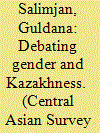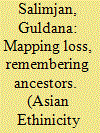| Srl | Item |
| 1 |
ID:
152311


|
|
|
|
|
| Summary/Abstract |
Aytis is a central component of Kazakh oral literature. It is a duelling performance of improvised oral poetry between two aqins (poets, or bards) accompanying themselves on the dombra, a two-stringed plucked instrument. This article analyses contending issues in a transnational aytis between Chinese and Kazakhstani aqins, and explores how gender plays into the complex interplay of transnational identity politics, nationalism, performer positionality, and the preservation of intangible cultural heritage. This article argues that, though minority actors are subject to state-patronized national projects and the gender paradigms those projects entail, they can also obtain empowerment from performing tradition as a way to legitimize their status as culture producers and flexible citizens. Situated as the guardians of a constructed gender balance in society, women performers of oral tradition occasionally find themselves with opportunities to transgress the boundaries of their national and gender norms.
|
|
|
|
|
|
|
|
|
|
|
|
|
|
|
|
| 2 |
ID:
177584


|
|
|
|
|
| Summary/Abstract |
Genealogical narratives are important aspects of Kazakh social life in China and the formation of self-identifications. They reflect tensions in competing forms of history-writing through which the Chinese state maintains control over its frontier. Through ethnography and critical analysis of locally produced and circulated genealogy books, this article traces the connections between genealogy as a way of knowing and its creative agency under the Chinese settler order in the Xinjiang Uyghur Autonomous Region. The article argues that Kazakh genealogy books as knowledge production are a response to Mao era assimilationist policies and reform era economic dispossession. Genealogy in this context mediates and mobilizes local histories, land epistemology, and gender ideals to construct Kazakh collective memory and belonging to ancestral places in northern Xinjiang.
|
|
|
|
|
|
|
|
|
|
|
|
|
|
|
|